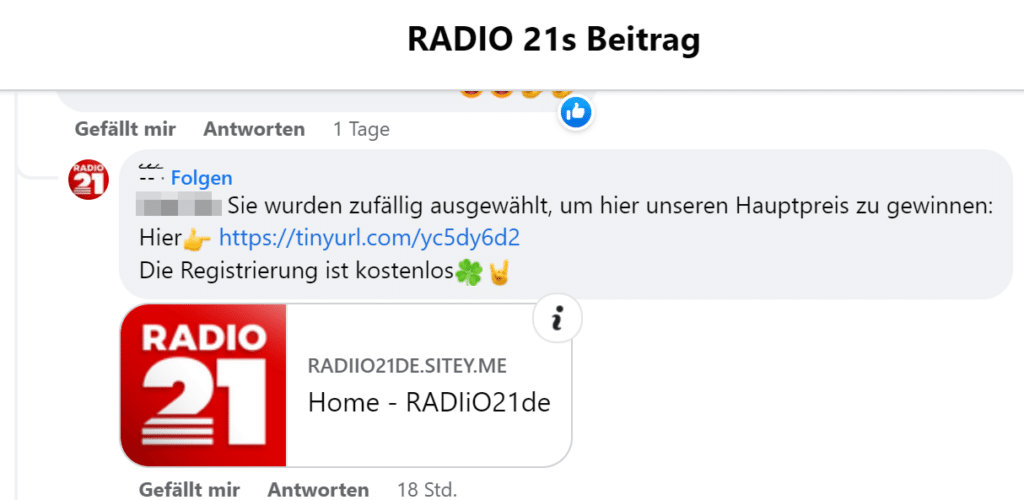Social media, especially Facebook, is an ideal place to get in touch with users and offer them attractive competitions. Reputable and verified Facebook pages often organize competitions that comply with the network's guidelines. Recently, however, a disturbing phenomenon has emerged: free riders! Scammers exploit the popularity of these competitions to trap unsuspecting users. They pose as organizers and comment on the actual, legitimate competition entries in order to lure users to their fake profiles.
Free riders on Facebook: Fraudsters imitate reputable sites and lure users into a trap
The scammers copy the name and profile picture of the reputable site and thus appear as their alleged representatives. In the comments they promise participants supposed winnings, but in return they demand personal data or other valuable information. This scam is extremely damaging not only for the users affected, but also for the reputation of the reputable sites.
Example: The radio station “RADIO 21” (including verification hook) is holding a competition on May 2nd, 2023!

A copycat sneaks in in the comments, uses the same profile picture (without the verification hook) and tags participants, saying they have now been selected to win the grand prize. The Radio 21 fake page lures participants to a website that has ABSOLUTELY NOTHING to do with the real RADIO 21 page!

We at Mimikama warn against responding to such fraudulent comments and advise caution. We recommend that you always check the verification of the Facebook page and, if you are unsure, contact the page concerned directly.
Facebook itself is hopefully aware of the problem and is continuously working to stop such fraudulent activities. Users are encouraged to report suspicious comments or pages immediately to prevent harm to other users.
In the meantime, site operators can strengthen the trust of their users through targeted communication and transparency. This includes clear communication of the terms and conditions of participation and the process of competitions as well as regular monitoring and moderation of comments.
Scammers posing as legitimate sites are a major problem that poses challenges for both users and site operators. However, increased vigilance and cooperation can help put a stop to such fraud attempts and ensure that serious competitions on Facebook continue to be fun.
In order to effectively counter fraud attempts such as free riders posing as legitimate sites, users and site operators should take measures and support each other.
Here are some tips that can help curb fraudulent activity and increase trust in Facebook sweepstakes:
- Use verification seal: Page operators should apply for Facebook's verification seal to underline their authenticity. The seal can help users distinguish the real page from fake profiles.
- Promote information exchange: Site operators should actively inform their users about attempted fraud and give them advice on how to recognize fraudulent comments. Users should report suspicious activities to the site operators in order to enable a quick response.
- Offer secure communication channels: When conducting competitions, site operators should rely on secure communication channels, for example by using messenger services with end-to-end encryption.
- Regular monitoring and moderation: To prevent attempted fraud, site operators should continuously monitor and moderate their comment columns. Suspicious comments should be deleted and reported immediately.
- Education and awareness: Users should always stay informed about the latest scams to stay informed and prevent possible fraud attempts. Site operators can provide information materials and actively educate their users.
- Cooperation with Facebook: Both users and site operators should work closely with Facebook and report suspicious activity to help the social network effectively combat fraudsters.
Through joint action by users and site operators, fraudulent activities on Facebook can be curbed and the fun of serious competitions can be maintained. Cooperation and vigilance are the key to strengthening trust in the platform and its offers and stopping fraudsters.
The current fake competition warning can be found HERE
Notes:
1) This content reflects the current state of affairs at the time of publication. The reproduction of individual images, screenshots, embeds or video sequences serves to discuss the topic. 2) Individual contributions were created through the use of machine assistance and were carefully checked by the Mimikama editorial team before publication. ( Reason )

